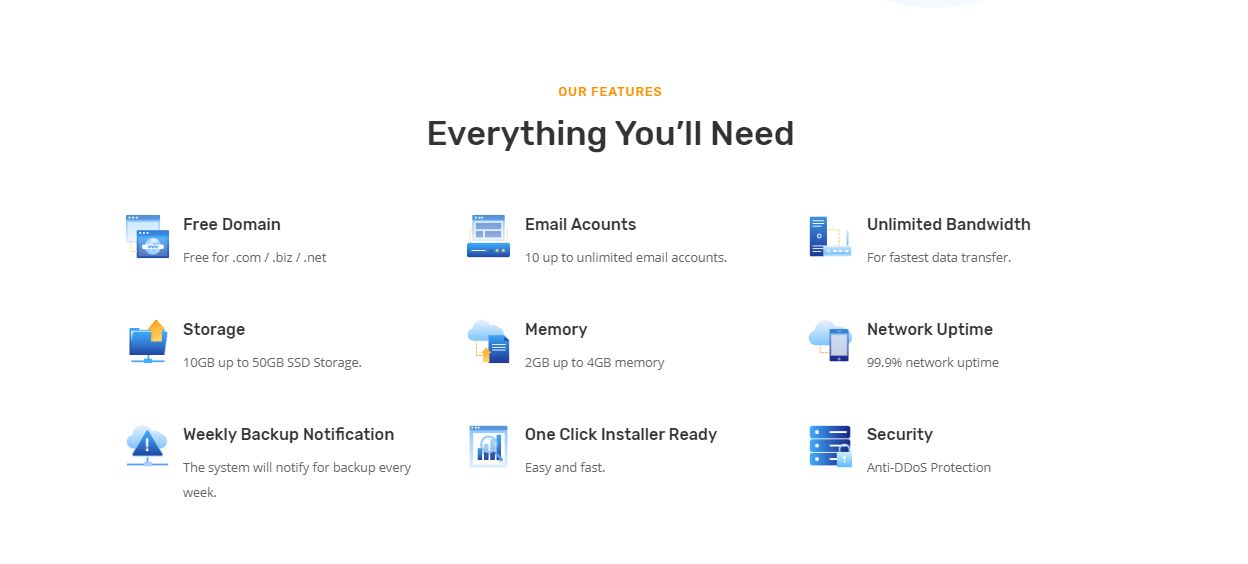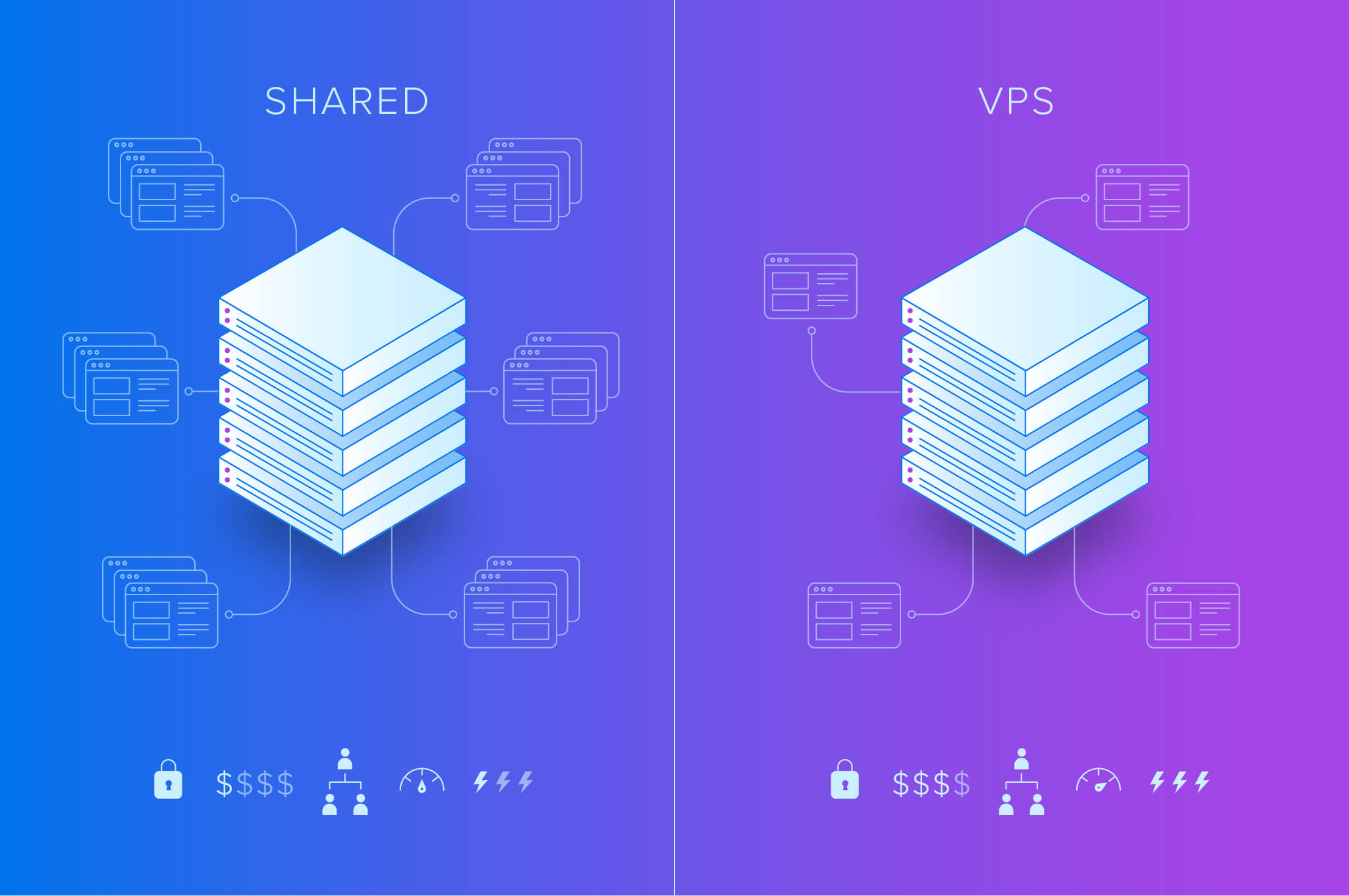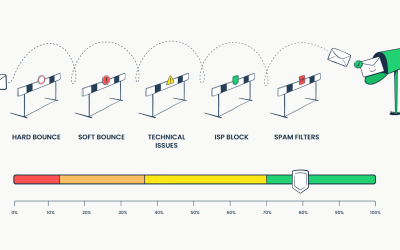The shared hosting vs VPS hosting comparison is similar to smartphone data plans. Let’s say, shared hosting is liked when a family is using a shared data plan among themselves. However, not all of the family members using the same amount of data plan. Maybe a brother will use more than any other member of his family int that month.
Now let us jump to VPS hosting understanding. VPS hosting is like you using individual data plan, not shared with other people. You can adjust how much data you wanted according to your needs.
In those short explanation, now you understand the differences between those two hosting. Selecting the right hosting for your business is quite tough. You need to confirm several factors for the right choice, including resource needs, performance demands, security requirements, cost constraints, server administration preferences, and stability expectations.

But don’t you worry, we will explain more about shared hosting vs VPS hosting in the section below.
The Difference Between Shared and VPS Hosting
For easy understanding, shared hosting means you are sharing the same server with other sites. Usually, it is the cheapest option but comes with limited bandwidth, administration, and performance capabilities. VPS hosting is a more premium option, with the ability for greater customization and increased performance. However, using premium service need to invest a lot to get better services. So, right now we will share the key point to consider before selecting between shared and VPS hosting.1. Server Resources
Shared hosting customers share server resources, whereas dedicated hosting users get a server dedicated to their sites’ needs. Meanwhile, VPS hosting lies in the middle of the grey area. When using shared hosting, you will face some limitations while using it. While no single account will impact another’s experience, there still will be maximum available CPUs, memory/RAM, and disk space. This hosting having maximum resources that allowed users to used it. There will be trouble if your website required a lot of space or processing power beyond the limitation. With VPS hosting, you’ll enjoy greater private disk space and higher overall resource availability. This will be necessary if you want to expand your business and need to offer customers a user experience that goes beyond the basic shared hosting level.2. Performance
The more resources means more performance. Shared hosting is only as performance your host implemented for speed. However, with VPS, you have more control over the performance factors. With any shared plan, other websites could affect your website’s performance. However, if your performance demands are limited and you value ease of maintenance, shared hosting will likely yield a higher return on investment. It’s no surprise that VPS hosting offers better overall performance based on the bandwidth it offers users. You’ll gain more flexibility to configure your applications on the server, but you’ll need to make sure you have a dedicated system administrator to keep the server running smoothly. If you have high traffic demands or multiple sites to manage, VPS will be the better option.3. Security
While sharing server resources presents huge benefits from a cost point of view, it can wreak havoc on the security end of things. It depends on how much the hosting provider has invested (both operational/team and purely financial resources) in ensuring dedicated protection for its shared hosting customers. Shared hosting can be considered very safe. However, be aware that security breaches can occur simply because a common server guarantees 100% security. The main reason is when one shared hosting customer makes a mistake or experience technical difficulty. This likely impacts to other sites because you are all sharing space on the same machine. Customer support will likely also be limited compared with VPS hosting. However, if your site won’t require sensitive personal information from users, you shouldn’t have an issue with shared hosting. You can ensure your site’s security with more robust safety features that are only available through VPS hosting. If your budget allows, you can implement better customer support services that will assist patrons when they need it. If your business needs to protect personal data, it’s worth considering the upgrade to a VPS.4. Pricing
Pricing for web hosting is a funny thing. You can easily find yourself paying more on shared hosting and absolutely hate the piss-poor service, or you could pay less for VPS and never look back. Those are extreme scenarios, of course, but hopefully, you catch my drift. With shared hosting, you defray the expenses associated with running and maintaining a server because you’re sharing server space with thousands of other websites. From a pure price point, shared hosting is the most economical choice and is a great option for those looking to host a site with standard functionality. As with any paid service, a more expensive plan offers more premium features, and the same rings true for VPS hosting. If you want to improve your website’s performance, VPS hosting will give you better customization and performance options than shared hosting.5. Server Administration
Shared hosts handle the hardware for you. You’re responsible for managing your VPS — unless you choose a host that handles server monitoring, bug fixes, and security patches for you. If you choose to host your website on a shared server, there is little to no technical maintenance of the server required on your end. That means you can enjoy basic server administration for your website at no additional cost to your budget or your precious time. For many, this is a huge plus as no dedicated system administrator is needed. VPS-hosted websites are often more complex in terms of resource management and therefore will usually require a specific system administrator to focus on maintaining the server. The tradeoff is that you’ll be able to customize your site and configure whatever applications and software you want while increasing performance and security.6. Scalability
The scalability factor is the tipping point for the shared-vs-virtual server debacle. If your site sees or is expected to see roughly 30,000 monthly visitors, a shared host can accommodate you and your site’s hosting needs. Much more than that and you might start receiving internal errors from your host. You’ll then need to consider a VPS or dedicated plan, and a VPS can handle any amount of traffic. While shared hosting is a great option for the short-term, you might face scalability issues, in the long run, depending on how your website grows. If you find you’re maxing out your storage capabilities, or if user demand is exceeding server space, you may need to consider scaling up to eke out better performance. The customizable features of VPS hosting allow you to scale more quickly and easily. If you predict you’ll eventually need to scale up on the fly to meet demand, the investment in VPS hosting now may pay off in the future.In Narrowcloud Solution we have offered you a better web hosting with a better price. Once you have considered to select whether shared hosting or VPS hosting, you can visit our store at narrowhost.









0 Comments